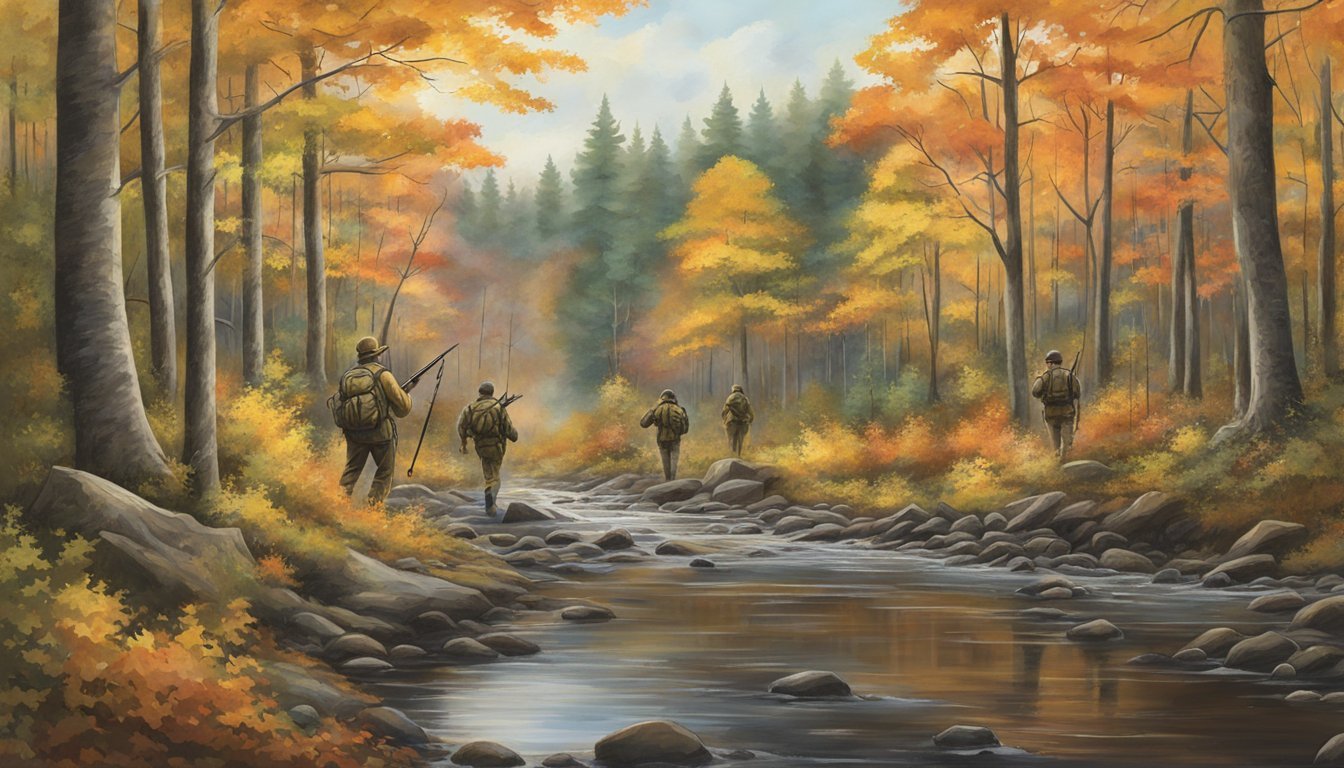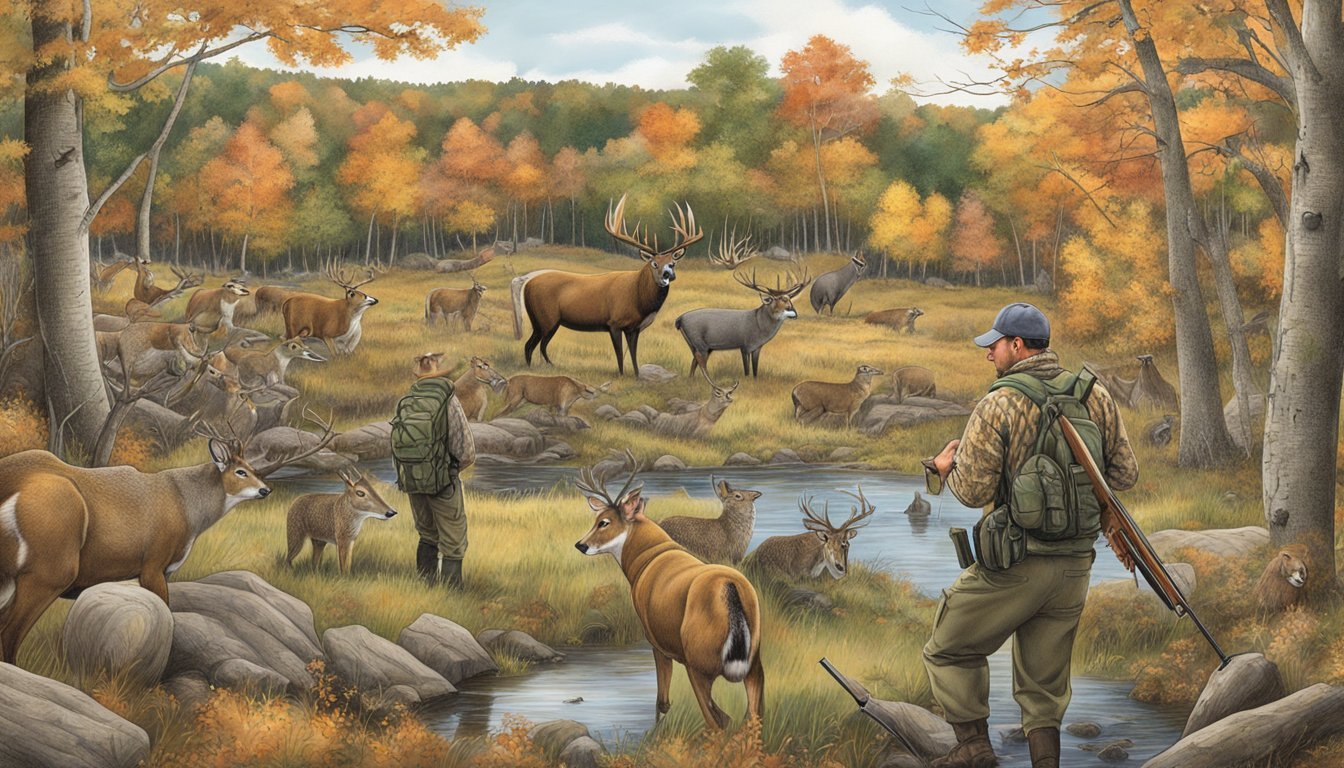Hunting Seasons in Massachusetts
Key Dates and Regulations
This Article is Part of Our Hunting Seasons Guide for All 50 US States
Hunting seasons in Massachusetts are regulated by the Massachusetts Fisheries and Wildlife Board and are subject to annual review to ensure sustainable wildlife populations and compatibility with other land uses. In order to hunt in the state, individuals must first obtain a hunting or sporting license. These licenses are prerequisites for pursuing various game during the designated seasons throughout the year.
The hunting calendar in Massachusetts offers different seasons for a variety of game. Notably, deer season is segmented into distinct periods that cater to different hunting practices, including Youth Deer Hunt Day, Archery season, and Shotgun season, as well as a time frame for hunters using primitive firearms. Archery season typically commences in early October, while the Shotgun season and Primitive Firearms season open later in the year.
Massachusetts maintains a no hunting policy on Sundays, which is important for hunters to remember when planning their activities. Each game species has specific bag and possession limits to prevent overharvesting. To ensure a safe and successful hunting experience, the Massachusetts Department of Conservation & Recreation provides education on hunting regulations and safety classes.
Overview of Massachusetts Hunting Seasons
Massachusetts offers varied hunting seasons tailored to the management of different species. Deer hunting is a primary game season, divided into archery, shotgun, and muzzleloader seasons. These generally occur in the fall, with specific dates changing slightly year to year. For instance, in 2024, the shotgun season runs from December 2 to December 14.
Turkey hunting includes a spring and fall season, while bear hunting happens primarily in September to early December. Small game, including rabbit, squirrel, and pheasant, extends across several months, typically providing more extended opportunities for hunters.
Waterfowl such as duck and goose have their seasons set based on federal frameworks and state input, often occurring in late fall and winter. Additionally, hunters can target crow, and for those with proper permits, predatory and furbearing species like bobcat and coyote can be pursued within their respective seasons.
The state places a strong emphasis on safety and regulations adherence. It requires licenses and adherence to bag limits, clearly outlined by the Massachusetts Fisheries and Wildlife Board and subject to annual review.
It's imperative for those interested in hunting in Massachusetts to stay informed of the specifics as regulations can change. Current information can be found on the official Mass.gov website or through their MassFishHunt portal.
Hunting Regulations in Massachusetts
In Massachusetts, hunters are expected to adhere to specific licensing requirements, legal hunting methods, and safety guidelines. Additionally, there are clear seasonal restrictions and bag limits that must be followed to ensure conservation and fair chase.
Licensing Requirements
Hunters in Massachusetts must obtain the appropriate hunting license before engaging in the sport. A standard hunting or sporting license is necessary, and for those hunting deer, bear, or turkey, reporting their harvest within 48 hours is mandatory. Special permits and stamps such as an antlerless deer permit, archery stamp, and others may be required depending on the game and method used.
Legal Hunting Methods
The state allows various hunting firearms and tools, including shotguns, primitive firearms, archery equipment, and muzzleloaders. The use of crossbows is also permissible under certain conditions. It's important for hunters to be aware that the regulations may vary by the game being pursued and ensure that they use the correct tools for the species and season.
Safety Guidelines and Hunter Education
Safety is paramount in Massachusetts hunting regulations. All hunters must complete a hunter education course before obtaining a license. During designated seasons, wearing blaze orange, such as caps or vests (at least 500 sq inches), is required. All hunters are encouraged to follow responsible hunting practices to ensure both personal and public safety.
Seasonal Restrictions & Bag Limits
Massachusetts enforces game-specific seasons and bag limits to manage wildlife populations sustainably. For example, deer seasons may vary by zone, and hunters must adhere to the specific dates and limitations. Small game seasons also have set periods and restrictions. These regulations are updated annually, and hunters should check the latest Massachusetts Department of Fish and Game information before planning their hunt.
Hunting Licenses and Permits
Before venturing into the various landscapes of Massachusetts for hunting, prospective hunters must first obtain the appropriate licenses and permits. These authorizations ensure that individuals abide by the regulations designed to preserve wildlife populations and promote safety.
Types of Hunting Licenses
Massachusetts offers several types of hunting licenses depending on the hunter's age, residency, and the wildlife they intend to pursue. The basic requirements stipulate that anyone aged 15 or older must have a valid hunting license. However, individuals aged 12-14 are allowed to hunt only under the direct supervision of a licensed hunter who is at least 18 years old, with both parties sharing a single bag limit and firearm or bow.
Resident Hunting License: For residents of Massachusetts, this license is necessary for hunting game within the state.
Non-Resident Hunting License: Individuals who are not Massachusetts residents require this license to hunt legally in the state.
Sporting License: Combines both fishing and hunting privileges, allowing for a broader range of outdoor activities.
Permit Acquisition Process
Acquiring hunting permits is an important step that must be taken after securing a hunting license. Permits are species-specific and are needed for certain types of game.
Permit System: Utilizes the MassFishHunt online portal for easy access to purchasing and printing permits.
Tagging Requirements: Upon a successful hunt, game must be properly reported and tagged through the same system.
Hunters can obtain these permits either online or at authorized locations and must follow the set guidelines for each species they target. For example, an antlerless deer permit is necessary for those aiming to hunt this specific type of game.
By complying with the licensing and permitting requirements, hunters contribute to the state's wildlife conservation efforts and ensure a sustainable hunting environment for future generations.
Wildlife and Game Management
Wildlife and Game Management in Massachusetts is a structured and strategic approach to maintaining and regulating wildlife populations. The Division of Fisheries and Wildlife, along with the Fisheries and Wildlife Board, implements initiatives for species sustainability and habitat conservation.
Species and Seasonal Cycles
Massachusetts is home to a diverse range of wildlife species that are managed through regulated hunting seasons to ensure ecological balance and species health. The state carefully structures these seasons to align with each species' natural life cycle and breeding periods. For instance, deer and turkey have specifically timed seasons that take into consideration their mating and fawning seasons to prevent undue impact on population levels.
The seasonal cycles for key species are as follows:
White-tailed Deer: Archery, shotgun, and primitive firearms seasons, from October to December.
Turkey: Spring season in April and May, and a fall season in October.
Bear: Split seasons that typically run from early September to early December.
Pheasant: From October to November.
Small Game, including ruffed grouse and hare: Fall and winter, varying by specific species.
Waterfowl and migratory birds: Seasonal dates set in accordance with federal regulations and migratory cycles.
These cycles are observed and enforced by MassWildlife, ensuring responsible wildlife management and ecological diversity.
Wildlife Conservation Efforts
Conservation is a pivotal aspect of wildlife management in Massachusetts. MassWildlife and the Fisheries and Wildlife Board are at the forefront of these efforts, establishing a network of Wildlife Management Areas that preserve a range of habitats for game and non-game species alike. These areas not only provide crucial habitat but also serve as research sites for studying wildlife health and population dynamics.
The state's strategy includes:
Habitat conservation and restoration projects.
Research and monitoring of wildlife populations and health.
Education and outreach to promote ethical hunting and awareness of wildlife conservation issues.
Through these concerted efforts, Massachusetts aims to balance recreational hunting with the need for nature preservation. Conservation initiatives tend to focus on a variety of habitats to support a wide range of species, from woodlands to wetlands, pivotal for species such as waterfowl and migratory birds. Coordination with federal agencies ensures that species which cross state boundaries receive adequate protection and management continuity.
Hunting Areas in Massachusetts
Massachusetts offers a diverse range of hunting areas, from the mountainous regions to the coastal bay areas. The state provides both public and private lands suitable for various hunting experiences, managed to maintain a balance of ecosystem health and recreational opportunities.
Public Hunting Lands
MassWildlife manages over 200,000 acres across Massachusetts, designated as Wildlife Management Areas (WMAs). Public lands in the state also include numerous state parks, forests, and National Wildlife Refuges (NWR) which are available to hunters during specific seasons set by regulatory authorities. These areas cover various terrains, from wilderness to forested lands, each with its own set of hunting opportunities and regulations. Hunters can access information on specific WMAs and public hunting lands via the MassFishHunt portal.
Wildlife Management Areas (WMAs): Over 200,000 acres managed by MassWildlife.
State Parks and Forests: Nearly 150 locations that include hunting possibilities.
National Wildlife Refuges (NWR): Federally managed lands with specific hunting regulations.
Hunting on Private Property
For those seeking to hunt on private lands in the Bay State, permission from landowners is requisite. It’s recommended that hunters secure written consent to ensure there are no misunderstandings regarding access and permissible activities. Private property often offers a more secluded hunting experience but may also have specific restrictions in place that differ from public regulations. Oftentimes, private landowners and hunters can work together to promote and safeguard local wildlife populations.
Permission Required: Written consent from property owners is advisable.
Landowner-Hunter Collaboration: Can contribute to wildlife conservation efforts.
Special Hunting Seasons & Events
Massachusetts offers unique opportunities for specific groups of hunters during special hunting seasons. These events are designed to provide a tailored hunting experience, ensuring accessibility and mentorship.
Youth Hunts
The Spring Youth Hunt is a special event that encourages young hunters to develop their skills in the field under the guidance of an experienced adult. Dates for this event are specifically chosen to provide an optimal hunting experience for youth before the general seasons begin.
Spring General Season: April 26 - May 22
Spring Youth Hunt: April 24
This event often serves as an introduction to hunting practices and ethics, fostering a new generation of responsible hunters.
Paraplegic Hunt
Massachusetts facilitates an inclusive hunting environment with the annual Paraplegic Hunt. This hunt provides an opportunity for individuals with mobility impairments to participate in the hunting seasons with the aid of specialized equipment and assistance. The state designates certain areas and times for this event, ensuring a safe and accessible hunting experience for all participants.
Other Hunting-Related Activities
In addition to hunting, Massachusetts offers varied opportunities for outdoor enthusiasts, including regulated fishing and trapping seasons as well as educational programs designed to enhance outdoor skills and conservation awareness.
Fishing and Trapping Seasons
Massachusetts extends its outdoor activities to include freshwater and saltwater fishing seasons, managed by the Division of Fisheries and Wildlife. Anglers must comply with the specific fishing regulations that are in place to maintain healthy fish populations. For trapping, enthusiasts should familiarize themselves with the MassFishHunt system to acquire necessary permits and understand the rules and schedules set forth for different trapping seasons. The Mass.gov website serves as a central resource for acquiring licenses and staying informed on current statutes.
Freshwater Fishing: Open year-round for most species; trout seasons vary by water body.
Saltwater Fishing: Governed by the Recreational Saltwater Fishing regulations; permits required.
Trapping: Specific seasons for different species, with regulations updated annually.
Educational Programs and Workshops
The state of Massachusetts prioritizes hunter education, requiring all new hunters to complete a Hunter Education Course before obtaining a hunting license. These courses are available throughout the year and cover essential topics such as safety, wildlife management, and hunting laws. The MassFishHunt Portal often lists upcoming workshops and events that aim to teach both young and adult participants various outdoor skills related to hunting, fishing, and trapping. Additional programs offered by the Department of Conservation & Recreation’s Universal Access Program strive to provide all individuals, regardless of physical ability, the opportunity to enjoy outdoor activities.
Hunter Education Courses: Mandatory for first-time hunters.
Skills Workshops: Offer instruction on topics like archery and responsible wildlife interaction.







